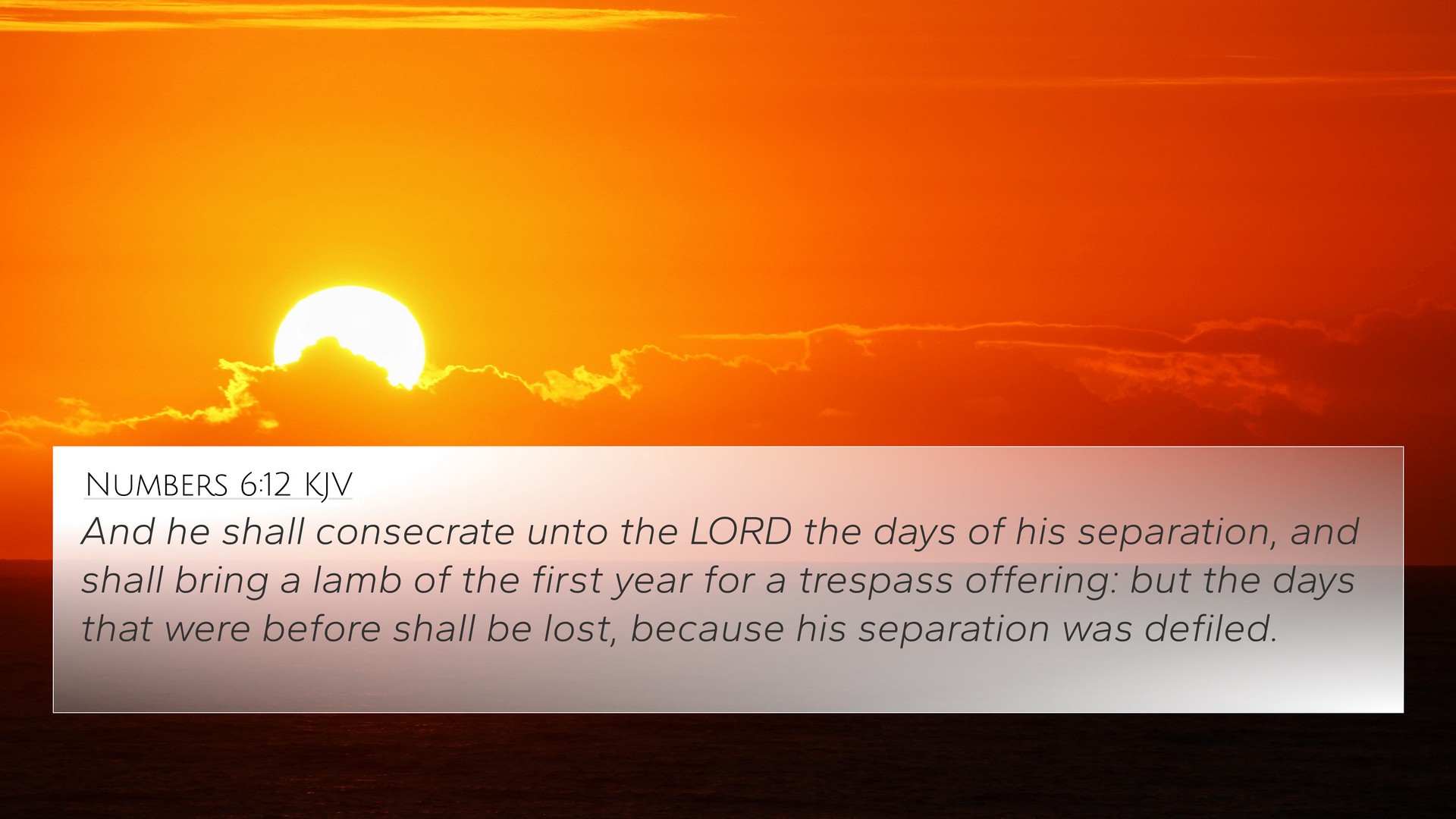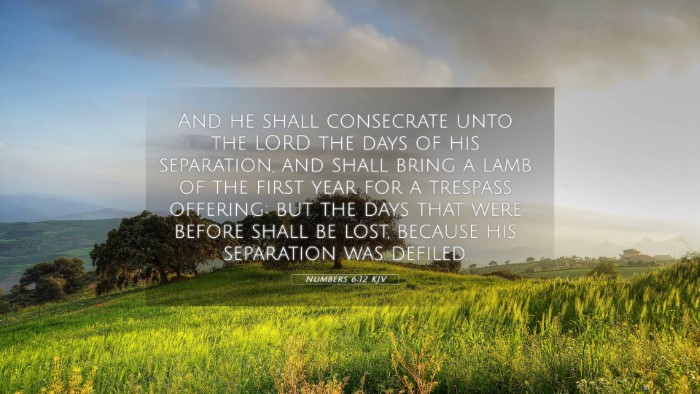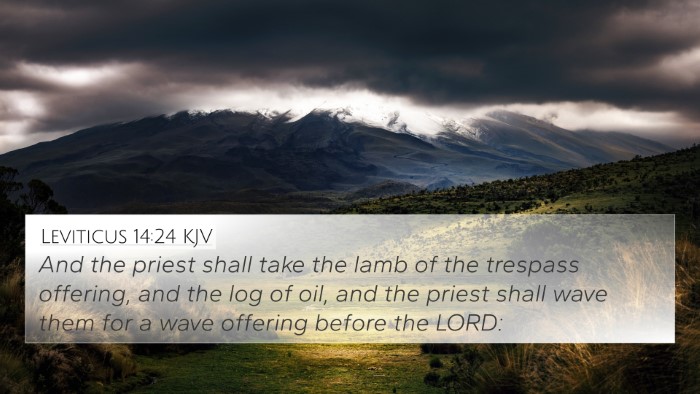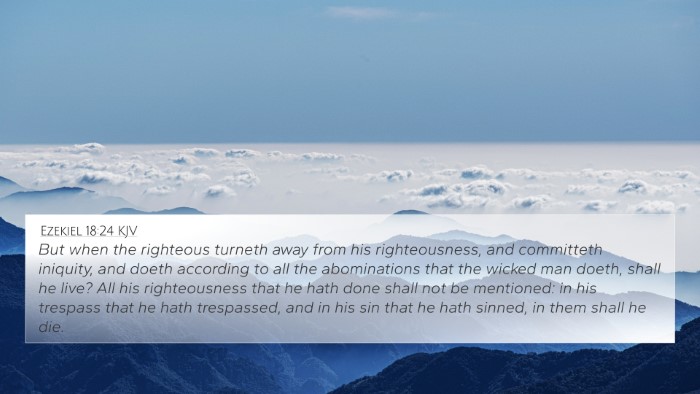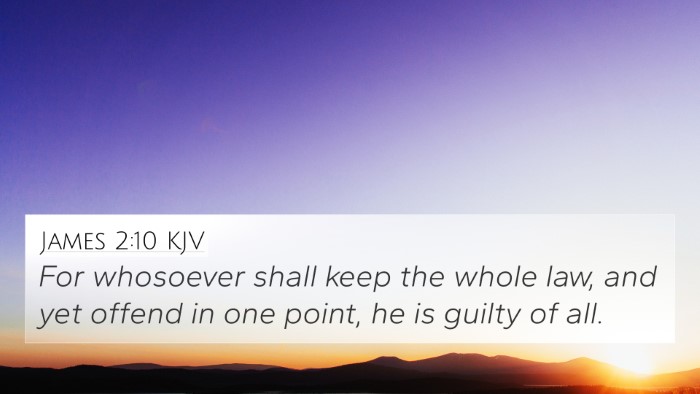Understanding Numbers 6:12
In this analysis, we will explore the meaning of Numbers 6:12 through insights gathered from public domain commentaries including those by Matthew Henry, Albert Barnes, and Adam Clarke. This verse is significant within the context of the Nazirite vow, a special dedication to the Lord that had certain requirements.
Verse Text
Numbers 6:12 states: "And he shall consecrate unto the LORD the days of his separation, and shall bring a lamb of the first year for a trespass offering: but the days that were before shall be lost, because his separation was defiled."
Meaning and Context
This verse is part of a larger passage that outlines the vows taken by Nazirites, individuals who set themselves apart for a period of special service to God. The commentary insights can be categorized as follows:
-
Matthew Henry: Henry emphasizes that the consecration indeed involves practices of separation, and the defilement of the vow necessitates restitution. The dedication is not merely about abstaining from certain things but requires specific offerings to signify renewal.
-
Albert Barnes: Barnes remarks on the importance of the offerings, as they are a visible manifestation of one's sincere intention to return to a state of purity after a period of defilement. He also connects this act of bringing offerings as a means of seeking restoration in fellowship with God.
-
Adam Clarke: Clarke focuses on the need for atonement when the vow is compromised, indicating that the lapse should not be taken lightly. He regards the lamb as a significant sacrifice that represents the seriousness of the situation and the importance of atonement in the process of restoration.
Thematic Insights
This verse emphasizes themes of separation, dedication, and atonement. The following key themes emerge:
- Separation for Holy Purposes: The act of setting oneself apart signifies a deep commitment to God's service.
- Consecration and Sacrifice: The necessity for offerings signifies the costs associated with pursuing holiness.
- Restoration and Atonement: The process of making amends highlights God's desire for His people to maintain righteousness even when they fall short.
Cross-References
To deepen your understanding of this verse, here are vital Bible cross-references that relate closely:
- Leviticus 10:10-11: Guidance on distinguish between holy and unholy.
- 1 Corinthians 9:24-27: The apostle Paul speaks of striving for crowns, echoing themes of separation and dedication.
- Hebrews 10:22: The call to draw near with a true heart in full assurance of faith, resonating with the themes of restoration.
- Romans 12:1: Offering our bodies as living sacrifices connects to the theme of consecration.
- 1 Peter 1:15-16: A call to be holy as God is holy connects to the core message of the Nazirite vow.
- Numbers 6:5: The specifics of the Nazirite vow, elaborating on the commitment involved.
- Isaiah 53:6: The notion of atonement through sacrifice is pivotal and resonates with the offering in this verse.
Application and Reflection
Reflecting on Numbers 6:12, one can consider how dedication to God requires intention and action. It challenges us to think about what we set apart in our lives for divine purposes and how we approach our failures. This verse invites us to explore:
- What areas in your life require a separation for God's purposes?
- How does understanding the importance of atonement alter your perspective on falling short in your commitments?
- In what ways can you symbolize your dedication to God through sacrifices in a contemporary context?
Conclusion
In conclusion, Numbers 6:12 serves as a profound reminder of the commitment involved in following God, the importance of restoration after failure, and the vital role of sacrifices in expressing our dedication. The connections made through Bible verse cross-references enrich our understanding of this Scripture, showing how various passages interact and deepen our insights into the overall biblical narrative.
